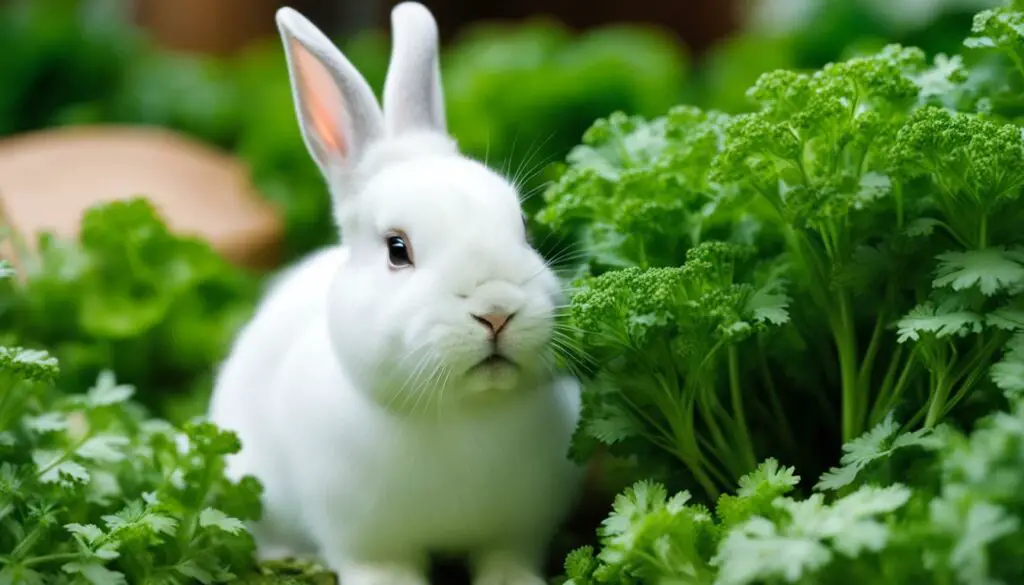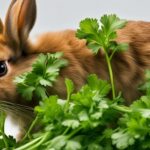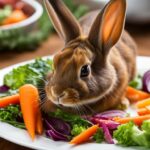Rabbits in the wild consume a variety of plants, including grasses, leaves, bark, twigs, fruits, and seeds. However, when it comes to a healthy diet for pet rabbits, the majority should consist of grass hay. Fresh foods, such as leafy greens and vegetables, should also be included in moderation. While parsley is safe for rabbits to eat, it should be introduced gradually and be part of a balanced diet.
Key Takeaways:
- Parsley is safe for rabbits to eat but should be introduced gradually.
- Parsley should be part of a balanced diet that consists mainly of grass hay.
- Rabbits in the wild consume a variety of plants, including grasses, leaves, bark, twigs, fruits, and seeds.
- Leafy greens and vegetables should also be included in moderation in a rabbit’s diet.
- Consult with a veterinarian or rabbit nutritionist for guidance on feeding parsley or any other foods to your pet rabbit.
The Importance of Hay in a Rabbit’s Diet
When it comes to feeding rabbits, hay plays a crucial role in their diet. It is a rich source of essential nutrients and provides numerous health benefits for these furry friends. Hay is packed with vitamins A and D, calcium, protein, and fiber, making it an essential component of a rabbit’s daily nutritional needs.
One of the main benefits of hay is its ability to promote dental health. Rabbits have continuously growing teeth, and chewing on hay helps wear down their teeth naturally, preventing dental issues such as overgrowth or malocclusion. Additionally, hay is essential for maintaining a healthy gastrointestinal tract. The high fiber content in hay aids in proper digestion and prevents common digestive problems in rabbits, such as hairballs and gastrointestinal stasis.
When choosing hay for your rabbit, it is important to opt for grass hay varieties like timothy, orchard, oat hay, or brome. These types of hay are low in calories and protein, providing the ideal balance for a rabbit’s diet. On the other hand, alfalfa hay should be avoided, as it is higher in calories and protein, which can lead to obesity and other health issues if overconsumed.
| Benefits of Hay in a Rabbit’s Diet | Recommended Hay Types |
|---|---|
| Rich in essential nutrients like vitamins A and D, calcium, and fiber. | Timothy hay, orchard hay, oat hay, brome hay |
| Promotes dental health by naturally wearing down teeth. | Avoid alfalfa hay due to high calorie and protein content. |
| Aids in proper digestion and prevents digestive problems. |
As an important part of a rabbit’s diet, hay should make up the majority of their daily food intake. It should be provided in unlimited quantities, allowing rabbits to graze on it throughout the day. Along with hay, fresh water and a variety of leafy greens and vegetables should be offered to ensure a well-rounded and balanced diet for these adorable pets.
Incorporating Fresh Foods into a Rabbit’s Diet
Fresh foods, including leafy greens, should also be a part of a rabbit’s diet. Leafy greens like parsley provide additional nutrients, different textures, and flavors that are enriching for rabbits. About 75% of the fresh part of a rabbit’s diet should be leafy greens. Other vegetables can make up to 15% of the diet, and fruits should be limited to 10%. It is important to wash or scrub all fresh foods before serving them to rabbits.
Leafy greens are an important source of vitamins and fiber for rabbits. They contribute to overall digestive health and provide variety in their diet. Some examples of leafy greens that are safe for rabbits to eat include spinach, mustard greens, Swiss chard, and dandelion greens. These greens should be introduced gradually to allow rabbits to adjust to them.
When incorporating fresh foods into a rabbit’s diet, it is important to remember that moderation is key. While parsley is safe for rabbits to eat, it should be given in small amounts and be part of a balanced diet. Offering a variety of fresh foods will provide rabbits with the necessary nutrients and keep them healthy and happy.
Table: Leafy Greens for Rabbits
| Leafy Greens | Description |
|---|---|
| Parsley | Safe for rabbits to eat. Provides additional nutrients and flavor. |
| Spinach | High in iron and fiber. Should be introduced gradually. |
| Mustard greens | Contain essential vitamins and minerals. Can be fed in moderation. |
| Swiss chard | Rich in antioxidants and fiber. Should be included in a varied diet. |
| Dandelion greens | Nutritious and readily available. Can be foraged or purchased. |
By incorporating fresh foods like parsley and other leafy greens into a rabbit’s diet, owners can provide a well-rounded and nutritious meal for their furry friends. Remember to introduce new foods gradually and monitor your rabbit’s digestion to ensure they adjust well to the changes. Offering a variety of fresh foods will not only keep rabbits healthy but also add variety and enrichment to their diet.
Parsley and Other Leafy Greens for Rabbits
Leafy greens are an essential part of a rabbit’s diet, providing them with important nutrients and variety. In addition to parsley, there are several other safe options that you can feed your rabbit to ensure a well-rounded and nutritious diet. Here is a list of leafy greens that rabbits can enjoy:
- Spinach
- Mustard greens
- Beet greens
- Swiss chard
- Radish tops
- Sprouts
- Arugula
- Carrot tops
- Cucumber leaves
- Kale
- Dandelion greens
- Mint
- Basil
- Watercress
- Wheatgrass
- Chicory
- Raspberry leaves
- Cilantro
- Radicchio
- Bok choy
- Fennel
- Borage leaves
- Dill leaves
- Yu choy
These leafy greens provide a variety of flavors and textures for your rabbit to enjoy. Remember to wash or scrub them thoroughly before serving them to your furry friend to remove any dirt or pesticides. Introduce new greens gradually to ensure that your rabbit’s digestive system can adjust. Offering a diverse range of leafy greens will help keep your rabbit happy and healthy.
| Leafy Greens | Benefits |
|---|---|
| Parsley | Rich in vitamins A, C, and K, and provides dietary fiber and iron. |
| Spinach | High in iron and other essential vitamins and minerals. |
| Mustard greens | Packed with antioxidants and vitamins A and C. |
| Beet greens | Contain fiber, potassium, and vitamins A and K. |
As with any new food, it is important to introduce parsley and other leafy greens gradually into your rabbit’s diet. Monitor their digestion and overall health to ensure they are tolerating the new foods well. Remember to consult with a veterinarian or rabbit nutritionist for specific dietary recommendations for your pet rabbit.
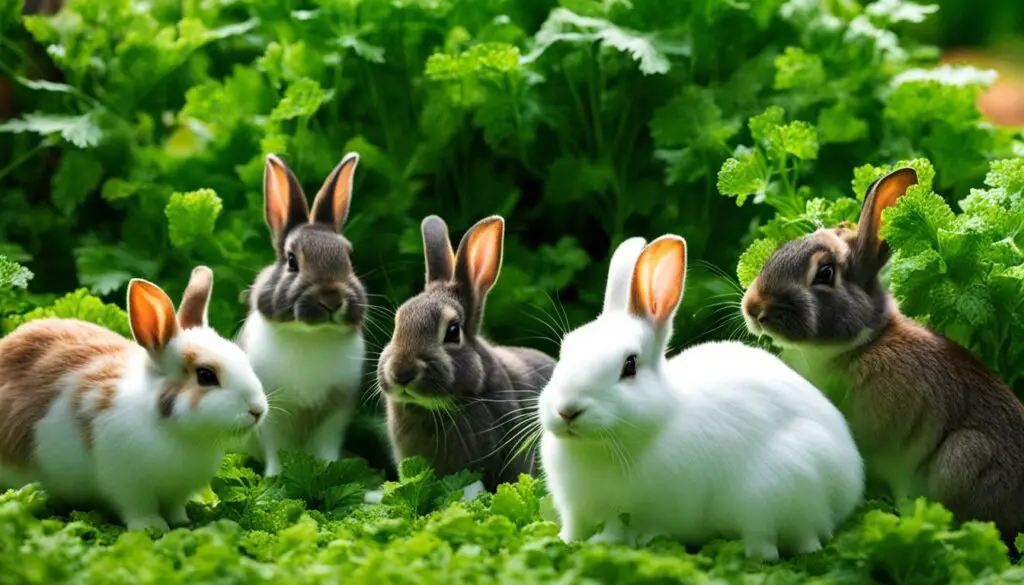
Non-Leafy Vegetables for Rabbits
While leafy greens are an essential part of a rabbit’s diet, non-leafy vegetables also offer nutritional benefits. These vegetables should make up a smaller portion, around 15%, of a rabbit’s overall diet. Including a variety of non-leafy vegetables can provide additional flavors, textures, and nutrients for your furry friend.
Safe options for non-leafy vegetables include carrots, broccoli, celery, bell peppers, Chinese pea pods, Brussels sprouts, cabbage, broccolini, summer squash, and zucchini squash. It is important to remember that these vegetables should be fed in moderation and incorporated into a well-balanced diet.
“Including non-leafy vegetables as part of a rabbit’s diet can provide added nutritional benefits and variety to their meals.”
When introducing non-leafy vegetables to your rabbit’s diet, it is recommended to start with small quantities and gradually increase the amount over time. This allows your rabbit’s digestive system to adjust and prevents any potential gastrointestinal upset. Always ensure that the vegetables are fresh, properly washed, and cut into manageable pieces for your rabbit to chew.
| Non-Leafy Vegetables for Rabbits | Benefits |
|---|---|
| Carrots | Good source of vitamin A and beta-carotene |
| Broccoli | Rich in vitamin C and fiber |
| Celery | Provides hydration and contains vitamins A, C, and K |
| Bell Peppers | High in vitamin C and antioxidants |
| Chinese Pea Pods | Crunchy and low in calories |
| Brussels Sprouts | Rich in fiber and vitamin C |
| Cabbage | Contains antioxidants and is a good source of fiber |
| Broccolini | Combines the flavors of broccoli and Chinese kale |
| Summer Squash | Hydrating and provides a range of vitamins and minerals |
| Zucchini Squash | Low in calories and rich in vitamin C |
Remember, a rabbit’s diet should consist predominantly of hay, followed by leafy greens, non-leafy vegetables, and limited amounts of fruits. Providing a diverse range of foods helps to ensure that your rabbit receives the necessary nutrients for optimal health and wellbeing.
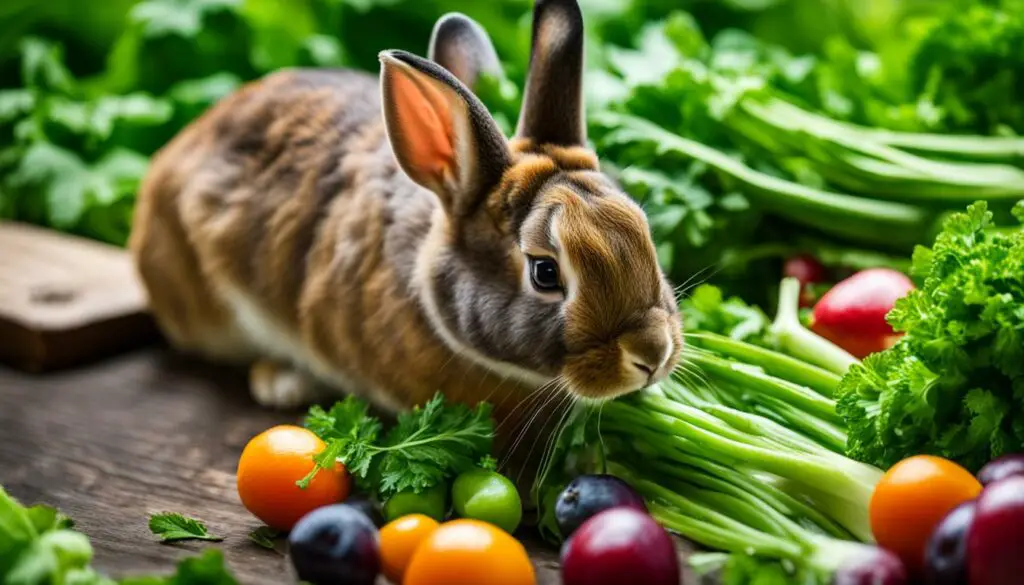
Adding Variety to Your Rabbit’s Diet
Including non-leafy vegetables can help add variety to your rabbit’s diet and prevent boredom. Rabbits naturally enjoy foraging and nibbling on different textures, so offering a mix of leafy greens and non-leafy vegetables can keep them engaged and satisfied.
It is essential to monitor your rabbit’s overall health and digestion when introducing new foods. If you notice any signs of discomfort or digestive issues, consult with a veterinarian or a rabbit nutritionist for guidance.
Always remember to provide fresh, clean water and ensure that your rabbit’s diet is well-balanced. By offering a range of nutritious foods, including non-leafy vegetables, you can contribute to your rabbit’s overall wellbeing and happiness.
Approved Fruits for Rabbits
When it comes to incorporating fruits into a rabbit’s diet, it’s important to choose the right ones and feed them in moderation. Fruits should make up about 10% of a rabbit’s overall diet to prevent any digestive issues or excessive sugar intake. Here are some approved fruits that you can safely feed to your bunnies:
- Apples
- Cherries
- Pears
- Peaches
- Plums
- Kiwi
- Papaya
- Mango
- Berries (strawberries, raspberries, blueberries)
- Pineapple
- Bananas
- Melons (watermelon, cantaloupe, honeydew)
- Star fruit
- Apricot
- Currants
- Nectarine
- Blackberries
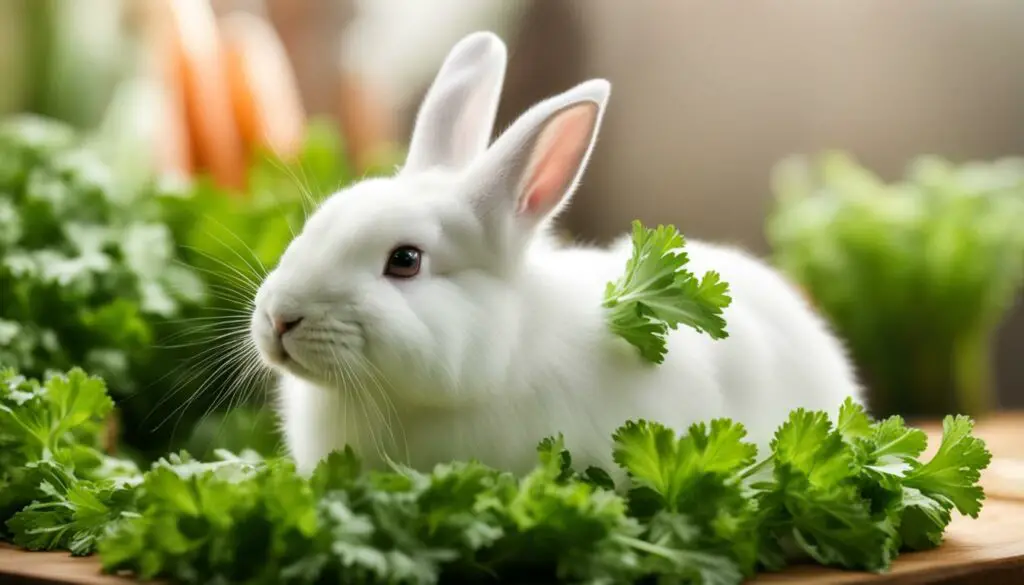
Remember to remove any seeds or pits from the fruits before feeding them to rabbits, as these can be choking hazards. It’s also important to introduce new fruits gradually to monitor your rabbit’s digestion and ensure they tolerate them well. If any digestive issues arise, it’s best to consult with a veterinarian for further guidance.
| Fruit | Precautions |
|---|---|
| Apples | Remove seeds and core before feeding. |
| Berries | Wash thoroughly before feeding. |
| Cherries | Remove the pit before feeding. |
| Pineapple | Feed in small amounts due to high sugar content. |
| Bananas | Feed in moderation due to high sugar content. |
| Melons | Remove seeds and rind before feeding. |
By including a variety of approved fruits in your rabbit’s diet, you can provide them with additional nutrients and flavors. Just remember to offer fruits as occasional treats and not as the main component of their diet. Rabbits should primarily be fed hay, fresh leafy greens, and a smaller portion of vegetables to ensure a balanced and healthy diet.
Alkaloids and Other Concerns
Rabbit owners may have concerns about the presence of alkaloids in certain plants, including parsley, and its potential toxicity to rabbits. While parsley does contain a relatively high level of oxalic acid, in small amounts it is not harmful to rabbits. However, it is recommended to feed a variety of greens in moderation and avoid a high concentration of oxalic acid-containing foods. This ensures a well-balanced diet for your furry friend.
Rabbits produce their own vitamin C and therefore do not rely solely on fruits and vegetables for this nutrient. However, incorporating fresh foods, including parsley, into a rabbit’s diet can provide additional vitamins and minerals. It’s important to note that parsley should be introduced gradually, and any signs of discomfort or digestive issues should be monitored.
In summary, when feeding parsley to rabbits, it is safe as long as it is part of a balanced diet. It’s always best to consult with a veterinarian or rabbit nutritionist for specific dietary recommendations for your pet rabbit.
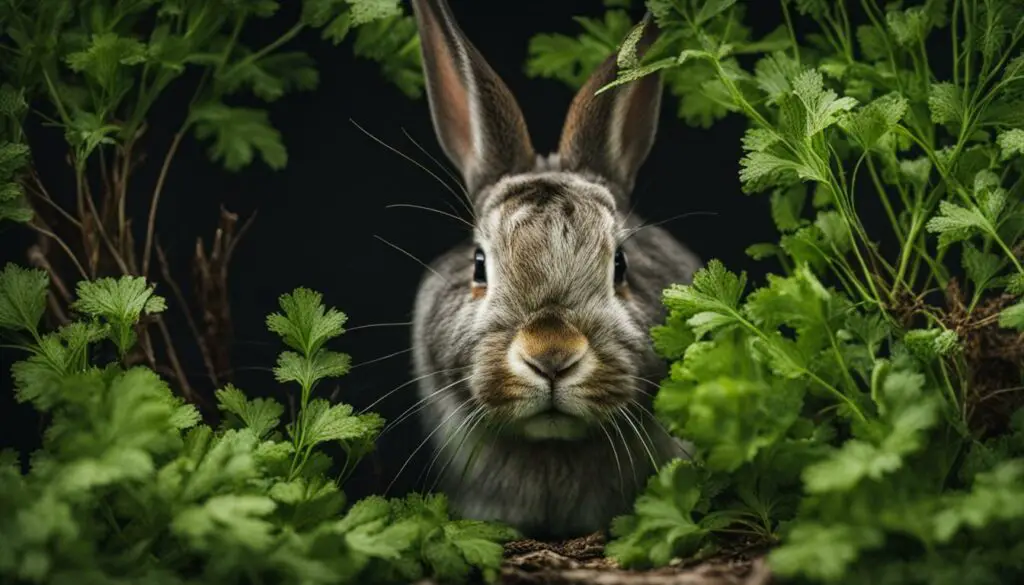
Alkaloids and Other Concerns
Alkaloids in certain plants, like parsley, can be a concern for rabbit owners. While parsley itself is safe for rabbits, it does contain a relatively high level of oxalic acid. However, in small amounts, parsley is not harmful to rabbits.
“Feeding a variety of greens in moderation and avoiding a high concentration of oxalic acid-containing foods is recommended.”
Rabbits produce their own vitamin C, so they do not depend solely on fruits and vegetables for this nutrient. However, adding fresh foods, such as parsley, to a rabbit’s diet can provide additional vitamins and minerals. It is important to introduce parsley slowly and monitor your rabbit’s digestion for any signs of discomfort or digestive issues.
In conclusion, parsley is safe for rabbits when fed as part of a balanced diet. It is always recommended to consult with a veterinarian or rabbit nutritionist for specific dietary guidelines for your pet.
Concerns About Gas and Goitrogenic Vegetables
When it comes to a rabbit’s diet, it’s important to be aware of certain vegetables that can cause gastrointestinal discomfort. However, it’s good news for rabbit owners that gas and goitrogenic vegetables, such as broccoli and cabbage, don’t usually have the same effect on rabbits as they do on humans. These vegetables can be fed in small quantities without negative consequences.
While humans may experience gas after consuming these vegetables, rabbits have a unique digestive system that allows them to process them without any major issues. In fact, rabbits are herbivores and have a specialized gastrointestinal system designed to break down fibrous foods like grass, leaves, and vegetables.
Despite this, it’s still important to feed these vegetables in moderation and make sure they are part of a varied diet. Starchy and sugary foods, including grains, legumes, and high-sugar fruits, should be limited in a rabbit’s diet to maintain a healthy digestive system. By including a wide variety of vegetables and monitoring your rabbit’s reactions, you can ensure their diet remains balanced and nutritious.
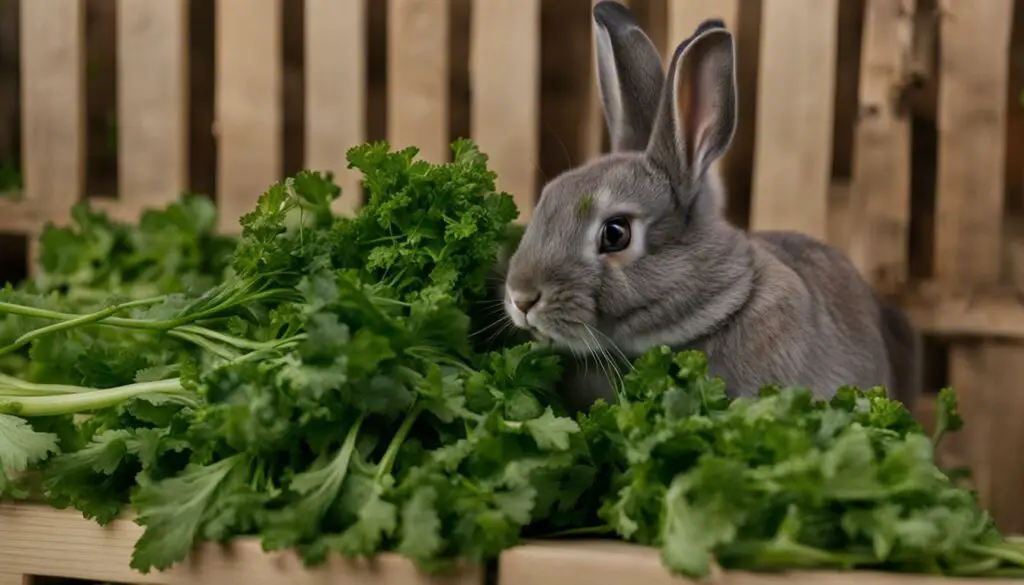
The Importance of a Balanced Diet for Rabbits
While some vegetables may cause gas, it’s essential to remember that a rabbit’s diet should consist of a variety of nutrients to support their overall health. The main focus should be on providing a sufficient amount of grass hay, which is rich in vitamins, minerals, and fiber. Additionally, incorporating fresh foods, such as leafy greens and vegetables like parsley, can contribute to a well-rounded diet for your rabbit.
By understanding the specific dietary needs of your rabbit and introducing vegetables gradually, you can ensure they receive the necessary nutrients without causing any digestive discomfort. Parsley is a safe addition to a rabbit’s diet, but as with any new food, it’s important to monitor your rabbit’s response and consult with a veterinarian or rabbit nutritionist if you have any concerns.
Vegetables to Limit
While vegetables are an important part of a rabbit’s diet, certain options should be fed in lesser amounts due to their higher starch or sugar content. These vegetables should be given sparingly to prevent digestive issues and maintain a balanced diet for your rabbit. It is best to limit the following vegetables to once or twice a week:
- Kale
- Carrot tops
- Beet tops
- Swiss chard
- Dandelion greens
These vegetables are still nutritious and can be included in your rabbit’s diet, but they should not make up a large portion of their daily food intake. By offering these vegetables in moderation, you can ensure that your rabbit receives a diverse range of nutrients without overwhelming their digestive system.
“Feeding these vegetables too often or in large quantities can lead to soft stool or digestive issues.”
Remember, it’s essential to provide a balanced diet for your rabbit, including a variety of leafy greens, non-leafy vegetables, and hay. Monitoring their digestion and overall health is crucial to ensure they are thriving. If you have any concerns about your rabbit’s diet or specific vegetables, consult with a veterinarian or rabbit nutritionist for personalized guidance.
| Vegetable | Serving Frequency |
|---|---|
| Kale | Once or twice a week |
| Carrot tops | Once or twice a week |
| Beet tops | Once or twice a week |
| Swiss chard | Once or twice a week |
| Dandelion greens | Once or twice a week |
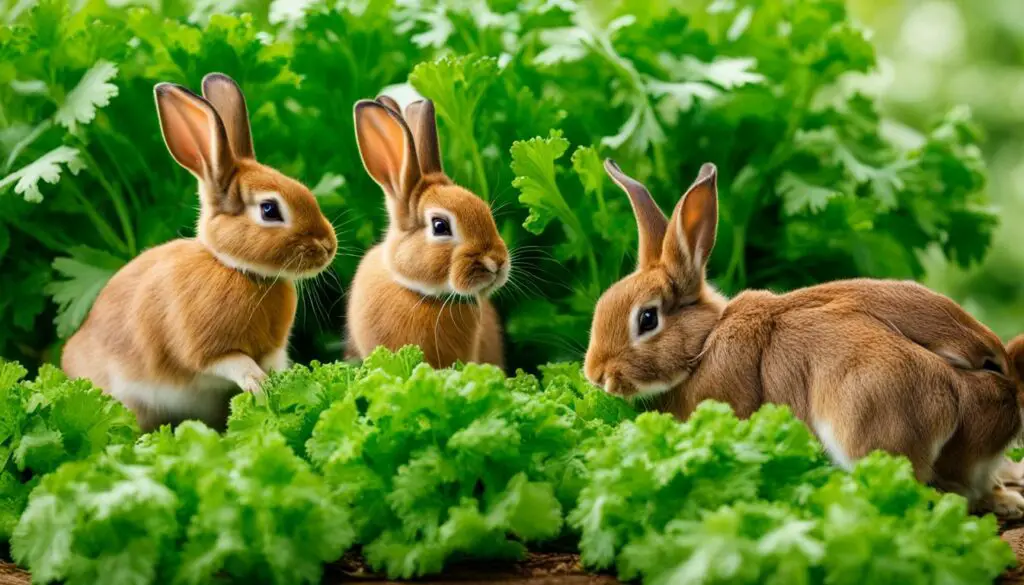
Foods to Avoid
When it comes to feeding rabbits, there are certain foods that should be avoided to ensure their safety and well-being. It’s essential to be aware of these foods and keep them out of your rabbit’s reach. Some foods can cause serious health issues, while others may simply be difficult for rabbits to digest. Here are some foods that should be avoided:
- Onions, garlic, leeks, and chives: These plants are part of the onion family and can cause blood abnormalities in rabbits.
- Corn: The kernels of corn can pose a risk of bowel obstruction in rabbits, so it’s best to avoid feeding them this food.
- Processed foods: Chocolate, cookies, crackers, and bread should not be given to rabbits as they are not part of their natural diet and may contain harmful ingredients.
- Dog or cat food: While it might be tempting to share pet food with your rabbit, it’s important to note that these products are specifically formulated for dogs or cats and may not meet the nutritional needs of rabbits.
- Bird seed or meat: These foods are not suitable for rabbits and should be kept away from them to prevent any potential health issues.
By avoiding these foods, you can help ensure that your rabbit stays healthy and happy. Always consult with a veterinarian or rabbit nutritionist for specific dietary recommendations for your furry friend.
The Importance of Parsley Toxicity Awareness
In particular, parsley toxicity in rabbits is a concern that owners should be aware of. While parsley itself is safe for rabbits to eat in moderation, it contains a relatively high level of oxalic acid. In small amounts, this is not harmful to rabbits. However, feeding a high concentration of oxalic acid-containing foods can lead to health issues. It’s important to provide a variety of greens and vegetables in your rabbit’s diet and avoid overfeeding them with parsley or other foods with high levels of oxalic acid.
| Foods to Avoid | Potential Risks |
|---|---|
| Onions, garlic, leeks, and chives | Blood abnormalities |
| Corn | Bowel obstruction |
| Processed foods | Potential harm from ingredients |
| Dog or cat food | Inadequate nutrition |
| Bird seed or meat | Potential health issues |
It’s important to prioritize your rabbit’s health and well-being by offering a balanced and varied diet. Avoiding foods that may be harmful or difficult to digest is crucial in maintaining a happy and healthy pet.
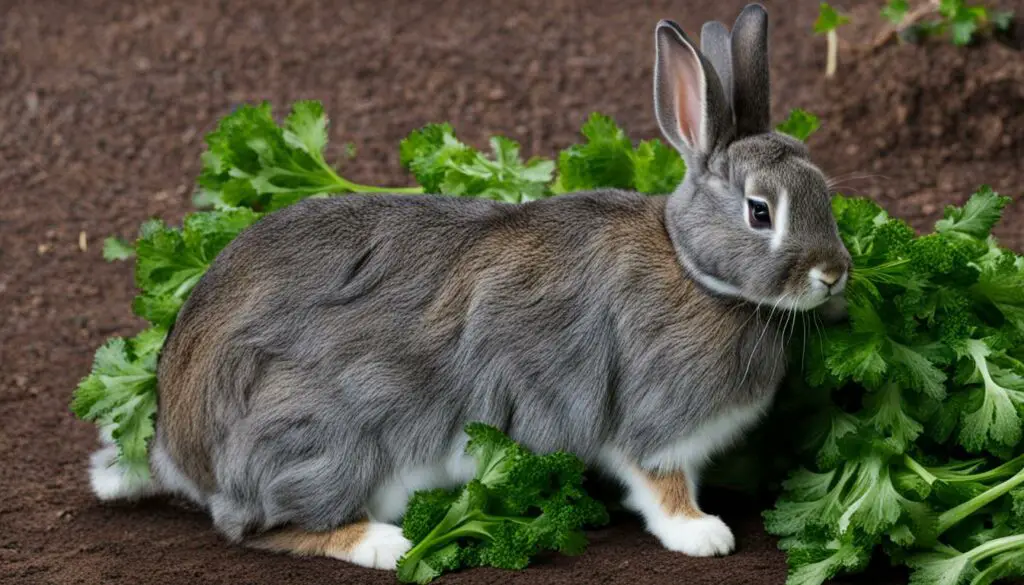
Parsley as a Nutritional Powerhouse
Parsley is not just a flavorful herb that adds a touch of freshness to your dishes; it is also a nutritional powerhouse for your rabbit. This vibrant green herb is packed with essential vitamins, minerals, and antioxidants that can contribute to your rabbit’s overall health and well-being.
One of the key nutrients found in parsley is vitamin A. This vitamin is crucial for maintaining healthy vision, supporting the immune system, and promoting the growth and development of cells and tissues in your rabbit’s body. Additionally, parsley is a great source of vitamin K, which plays a role in blood clotting and proper bone health.
Parsley also contains dietary fiber, which helps promote healthy digestion in rabbits. Fiber is essential for maintaining a well-functioning gastrointestinal tract and preventing issues such as gastrointestinal stasis. Including parsley in your rabbit’s diet can help ensure they are getting the necessary fiber intake.
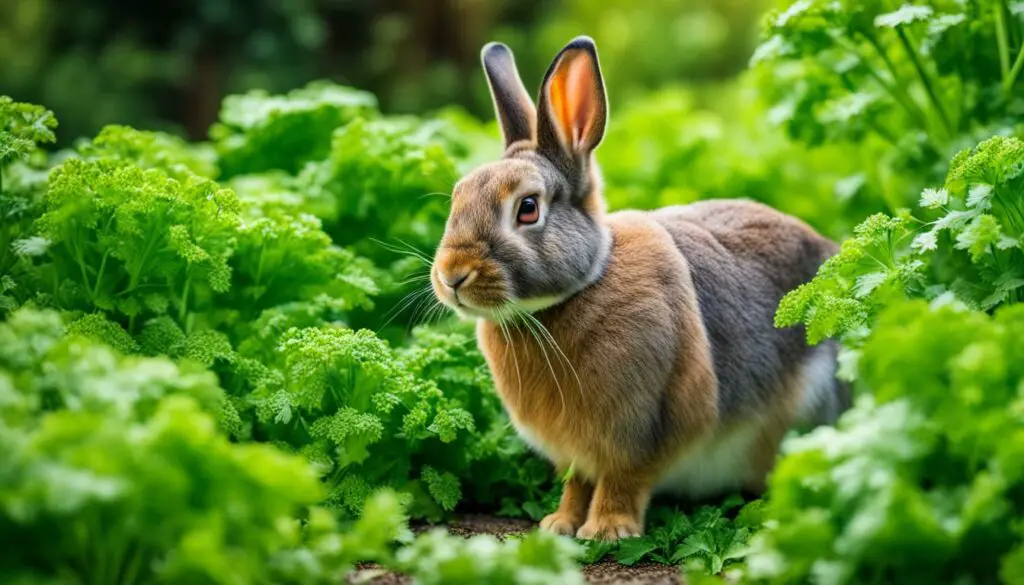
Table: Nutritional Content of Parsley
| Nutrient | Amount per 100g |
|---|---|
| Vitamin A | 5054 IU |
| Vitamin K | 1640 mcg |
| Calcium | 138 mg |
| Iron | 6.2 mg |
| Dietary Fiber | 3.3 g |
As with any food, moderation is key when feeding parsley to your rabbit. While parsley is safe for most rabbits, it should be introduced gradually and be part of a balanced diet that includes other leafy greens and vegetables. Consult with a veterinarian or rabbit nutritionist for specific dietary recommendations for your rabbit’s needs.
How to Introduce Parsley to Your Rabbit’s Diet
When it comes to introducing parsley to your rabbit’s diet, it’s important to take a gradual approach. Start by offering a small sprig of parsley and observe your rabbit’s reaction and digestion. If there are no signs of discomfort, you can gradually increase the amount of parsley over time. Rabbits generally enjoy the taste of parsley, so once they have adapted to it, you can include it as part of their daily serving of greens.
It’s crucial to remember that parsley should be part of a well-rounded and balanced diet for your rabbit. While parsley is safe for rabbits to eat, it should not be the only green in their diet. Offer a variety of other leafy greens and vegetables to ensure they receive all the necessary nutrients.
Introducing New Foods to Your Rabbit
When introducing any new food to your rabbit’s diet, including parsley, it’s essential to do so gradually. This allows their digestive system to adjust and reduces the chance of digestive upset. Start by offering a small amount and then gradually increase the quantity over several days or weeks. Monitor your rabbit for any signs of diarrhea or other digestive problems, and if any issues arise, consult with a veterinarian.
It’s also important to remember that each rabbit is unique, and their dietary needs may vary. Consult with a veterinarian or rabbit nutritionist for personalized advice on feeding parsley or any other foods to your specific rabbit. They can provide guidance on portion sizes, frequency, and any specific dietary considerations.
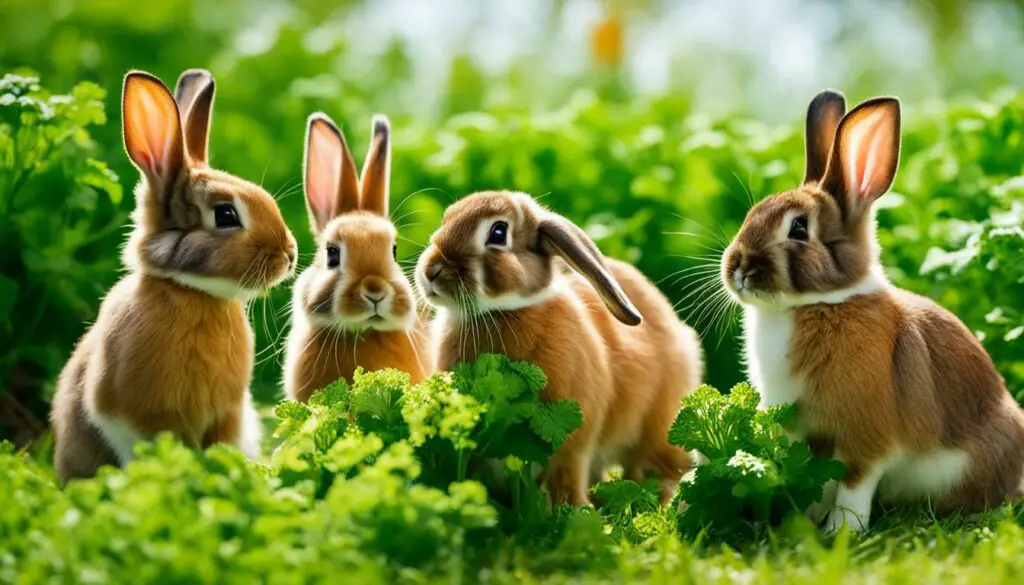
| Foods to Introduce Gradually | Foods to Monitor for Digestive Issues | Foods to Limit |
|---|---|---|
| Parsley | Broccoli | Kale |
| Spinach | Cabbage | Carrot tops |
| Mustard greens | Brussels sprouts | Swiss chard |
“Introducing new foods to your rabbit’s diet should be done gradually to avoid digestive issues. Monitor your rabbit’s reactions and consult with a professional for personalized advice.”
Remember, a rabbit’s diet should primarily consist of grass hay, with fresh foods like parsley being introduced in moderation. Providing a varied diet that includes a range of leafy greens, vegetables, and occasionally fruits will help ensure your rabbit receives all the necessary nutrients for a healthy and balanced life.
Types of Parsley for Rabbits
When it comes to feeding your rabbit parsley, it’s important to know that both flat-leaf and curly-leaf parsley are safe options. Whether you choose one variety over the other is purely a matter of personal preference. Both types of parsley offer the same nutritional benefits and can be a flavorful addition to your rabbit’s diet.
When selecting parsley for your rabbit, it’s best to choose fresh whole sprigs rather than dried parsley. Fresh parsley is more palatable and provides a better texture for your bunny to enjoy. Additionally, opting for organic parsley can help reduce the risk of exposing your rabbit to harmful pesticides or wax that may be present on conventionally grown parsley.
Benefits of Parsley for Rabbits
Parsley is not only safe for rabbits to eat, but it also offers a range of nutritional benefits. This herb is packed with essential vitamins and minerals, including vitamin A, vitamin K, dietary fiber, and iron. These nutrients contribute to your rabbit’s overall health and well-being.
Additionally, parsley has antioxidant properties that can support heart health and aid in cancer prevention. By incorporating fresh parsley into your rabbit’s diet, you can provide them with a flavorful and nutritious treat that helps promote their overall vitality.
| Type of Parsley | Safety for Rabbits |
|---|---|
| Flat-leaf parsley | Safe for rabbits |
| Curly-leaf parsley | Safe for rabbits |
Table: Types of Parsley and Safety for Rabbits
It’s important to note that while parsley is safe for rabbits to eat, it should be fed in moderation as part of a balanced diet. Remember to introduce parsley gradually, monitor your rabbit’s digestion, and offer a variety of other greens and vegetables to ensure they receive a well-rounded nutritional intake.
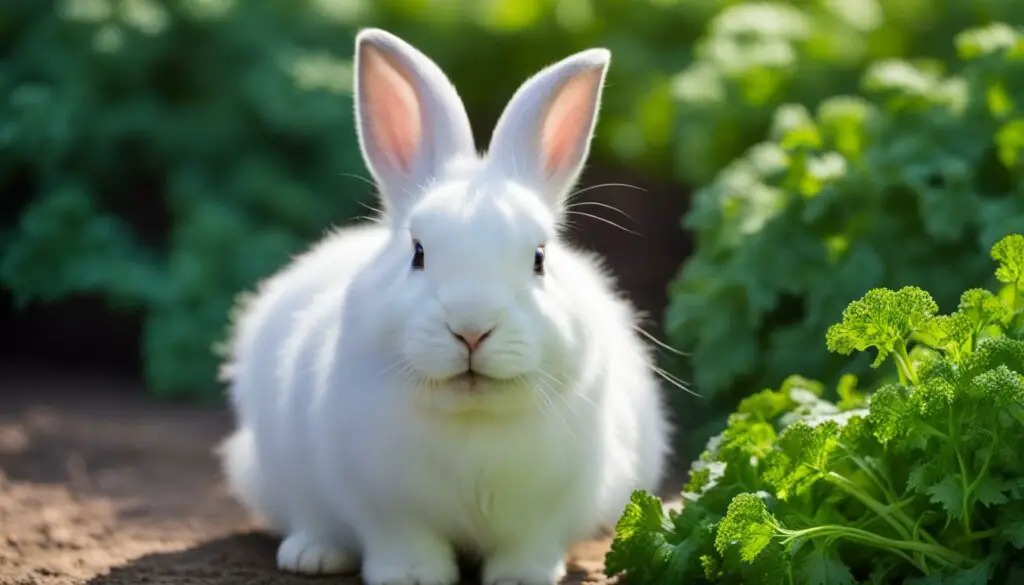
Conclusion
In conclusion, parsley is a safe and nutritious addition to a rabbit’s diet. It can provide essential vitamins and minerals, contributing to your rabbit’s overall health and well-being. When introducing parsley to your rabbit’s diet, it is important to start slowly, monitor their digestion, and gradually increase the amount over time. Rabbits generally enjoy parsley, so once they have adapted to it, it can be included as part of their daily serving of greens.
However, it is crucial to remember that parsley should be fed in moderation as part of a balanced diet. It should be accompanied by a variety of other leafy greens and vegetables. About 75% of a rabbit’s fresh food intake should consist of leafy greens, while other vegetables can make up to 15%, and fruits should be limited to 10% of their diet.
If you are unsure about feeding parsley or any other foods to your pet rabbit, it is always best to consult with a veterinarian or rabbit nutritionist. They can provide you with specific guidance based on your rabbit’s individual needs and ensure their diet is well-rounded and appropriate for their health.
FAQ
Can rabbits eat parsley?
Yes, parsley is safe for rabbits to eat as part of a balanced diet.
How much parsley should I give my rabbit?
When introducing parsley to your rabbit’s diet, start slowly and gradually increase the amount over time. Monitor your rabbit’s digestion and offer a variety of other greens and vegetables for a well-rounded diet.
What other leafy greens can rabbits eat?
Rabbits can also eat spinach, mustard greens, beet greens, Swiss chard, radish tops, sprouts, arugula, carrot tops, cucumber leaves, kale, dandelion greens, mint, basil, watercress, wheatgrass, chicory, raspberry leaves, cilantro, radicchio, bok choy, fennel, borage leaves, dill leaves, and yu choy.
Can rabbits eat non-leafy vegetables?
Yes, rabbits can eat non-leafy vegetables in moderation. Safe options include carrots, broccoli, edible flowers, celery, bell peppers, Chinese pea pods, Brussels sprouts, cabbage, broccolini, summer squash, and zucchini squash.
What fruits are safe for rabbits?
Safe fruits for rabbits include apples, cherries, pears, peaches, plums, kiwi, papaya, mango, berries, pineapple, bananas, melons, star fruit, apricot, currants, nectarine, and berries.
Can parsley be harmful to rabbits?
In small amounts, parsley is not harmful to rabbits. However, it is important to feed a variety of greens in moderation and avoid a high concentration of oxalic acid-containing foods.
Can rabbits eat broccoli and cabbage?
Yes, rabbits can eat broccoli and cabbage in small quantities without negative effects. However, it is important to feed these vegetables in moderation and include a variety of other vegetables in a rabbit’s diet.
What foods should I avoid feeding my rabbit?
Avoid feeding onions, garlic, leeks, chives, corn, processed foods like chocolate, cookies, crackers, and bread, as well as dog or cat food, bird seed, and meat.
What are the nutritional benefits of parsley?
Parsley is packed with nutrients, including vitamins A and K, dietary fiber, and iron. It has antioxidant properties and can be beneficial for heart health and cancer prevention.
How do I introduce parsley to my rabbit’s diet?
Start slowly by offering a small sprig of parsley and gradually increase the amount over time. Monitor your rabbit’s digestion for any signs of discomfort.
Can rabbits eat both flat-leaf and curly-leaf parsley?
Yes, both flat-leaf and curly-leaf parsley are safe for rabbits to eat. Fresh whole sprigs are preferred over dried parsley, and organic options are preferable to reduce the risk of pesticides or wax.

